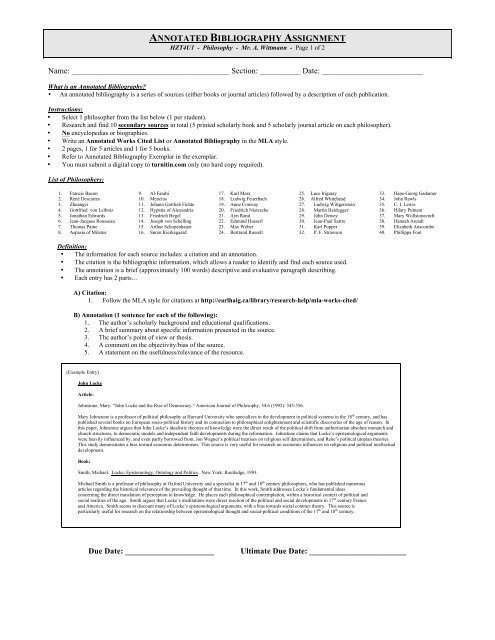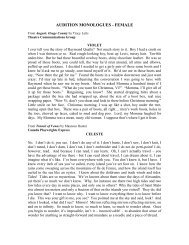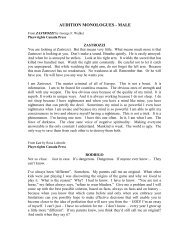annotated bibliography assignment - Earl Haig Secondary School
annotated bibliography assignment - Earl Haig Secondary School
annotated bibliography assignment - Earl Haig Secondary School
You also want an ePaper? Increase the reach of your titles
YUMPU automatically turns print PDFs into web optimized ePapers that Google loves.
ANNOTATED BIBLIOGRAPHY ASSIGNMENT<br />
HZT4U1 - Philosophy - Mr. A. Wittmann - Page 1 of 2<br />
Name: _______________________________________ Section: __________ Date: _________________________<br />
What is an Annotated Bibliography?<br />
• An <strong>annotated</strong> <strong>bibliography</strong> is a series of sources (either books or journal articles) followed by a description of each publication.<br />
Instructions:<br />
• Select 1 philosopher from the list below (1 per student).<br />
• Research and find 10 secondary sources in total (5 printed scholarly book and 5 scholarly journal article on each philosopher).<br />
• No encyclopedias or biographies.<br />
• Write an Annotated Works Cited List or Annotated Bibliography in the MLA style.<br />
• 2 pages, 1 for 5 articles and 1 for 5 books.<br />
• Refer to Annotated Bibliography Exemplar in the exemplar.<br />
• You must submit a digital copy to turnitin.com only (no hard copy required).<br />
List of Philosophers:<br />
1. Francis Bacon<br />
2. René Descartes<br />
3. Zhuangzi<br />
4. Gottfried von Leibniz<br />
5. Jonathan Edwards<br />
6. Jean-Jacques Rousseau<br />
7. Thomas Paine<br />
8. Aspasia of Miletus<br />
9. Al-Farabi<br />
10. Mencius<br />
11. Johann Gottlieb Fichte<br />
12. Hypatia of Alexandria<br />
13. Friedrich Hegel<br />
14. Joseph von Schelling<br />
15. Arthur Schopenhauer<br />
16. Søren Kierkegaard<br />
17. Karl Marx<br />
18. Ludwig Feuerbach<br />
19. Anne Conway<br />
20. Friedrich Nietzsche<br />
21. Ayn Rand<br />
22. Edmund Husserl<br />
23. Max Weber<br />
24. Bertrand Russell<br />
25. Luce Irigaray<br />
26. Alfred Whitehead<br />
27. Ludwig Wittgenstein<br />
28. Martin Heidegger<br />
29. John Dewey<br />
30. Jean-Paul Sartre<br />
31. Karl Popper<br />
32. P. F. Strawson<br />
Definition:<br />
• The information for each source includes: a citation and an annotation.<br />
• The citation is the bibliographic information, which allows a reader to identify and find each source used.<br />
• The annotation is a brief (approximately 100 words) descriptive and evaluative paragraph describing.<br />
• Each entry has 2 parts…<br />
A) Citation:<br />
1. Follow the MLA style for citations at http://earlhaig.ca/library/research-help/mla-works-cited/<br />
B) Annotation (1 sentence for each of the following):<br />
1. The author’s scholarly background and educational qualifications.<br />
2. A brief summary about specific information presented in the source.<br />
3. The author’s point of view or thesis.<br />
4. A comment on the objectivity/bias of the source.<br />
5. A statement on the usefulness/relevance of the resource.<br />
(Example Entry)<br />
John Locke<br />
Article:<br />
Johnstone, Mary. “John Locke and the Rise of Democracy.” American Journal of Philosophy, 54.6 (1992): 345-356.<br />
Mary Johnstone is a professor of political philosophy at Harvard University who specializes in the development in political systems in the 18 th century, and has<br />
published several books on European socio-political history and its connection to philosophical enlightenment and scientific discoveries of the age of reason. In<br />
this paper, Johnstone argues that John Locke’s idealistic theories of knowledge were the direct result of the political shift from authoritarian absolute monarch and<br />
church structures, to democratic models and independent faith developments during the reformation. Johnstone claims that Locke’s epistemological arguments<br />
were heavily influenced by, and even partly borrowed from, Jon Wagner’s political treatises on religious self determinism, and Rene’s political utopian theories.<br />
This study demonstrates a bias toward economic determinism. This source is very useful for research on economic influences on religious and political intellectual<br />
development.<br />
Book:<br />
Smith, Michael. Locke: Epistemology, Ontology and Politics. New York: Routledge, 1993.<br />
Michael Smith is a professor of philosophy at Oxford University and a specialist in 17 th and 18 th century philosophers, who has published numerous<br />
articles regarding the historical relevance of the prevailing thought of that time. In this work, Smith addresses Locke’s fundamental ideas<br />
concerning the direct translation of perception to knowledge. He places each philosophical contemplation, within a historical context of political and<br />
social realities of the age. Smith argues that Locke’s meditations were direct reaction of the political and social developments in 17 th century France<br />
and America. Smith seems to discount many of Locke’s epistemological arguments, with a bias towards social contract theory. This source is<br />
particularly useful for research on the relationship between epistemological thought and social-political conditions of the 17 th and 18 th century.<br />
33. Hans-Georg Gadamer<br />
34. John Rawls<br />
35. C. I. Lewis<br />
36. Hilary Putnam<br />
37. Mary Wollstonecraft<br />
38. Hannah Arendt<br />
39. Elizabeth Anscombe<br />
40. Phillippa Foot<br />
Due Date: ______________________ Ultimate Due Date: ________________________
ANNOTATED BIBLIOGRAPHY ASSIGNMENT<br />
HZT4U1 - Philosophy - Mr. A. Wittmann - Page 2 of 2<br />
Name: _______________________________________ Section: __________ Date: _________________________<br />
Marking Scheme:<br />
A) Professionalism (application): _______ /10<br />
• Submitted in appropriate time.<br />
B) Title page (communication): _______ /5<br />
• Title, name, date, course code, course section, teacher’s name, appropriate images<br />
C) Presentation & overall layout (communication): _______ /10<br />
• Organized and well designed layout and followed exemplar, stapled, no folder<br />
D) 5 appropriate articles (think/inquiry): _______ /5<br />
• Appropriateness and number<br />
E) Organization & format of 5 article citations (thinking/inquiry): _______ /10<br />
• Well organized and followed for MLA style properly<br />
F) Quality & format of 5 article annotations (knowledge/understanding): _______ /20<br />
• At least 5 clear, concise, precise & appropriate statements<br />
G) 5 appropriate books (thinking/inquiry): _______ /5<br />
• Appropriateness and number<br />
H) Organization & format of 5 book citations (thinking/inquiry): _______ /15<br />
• Well organized and followed for MLA style properly<br />
I) Quality & format of 5 book annotations (knowledge/understanding): _______ /20<br />
• At least 5 clear, concise, precise and appropriate statements<br />
J) Overall originality (thinking/inquiry): _______ /10<br />
• Based on Turnitin.com rating<br />
Comments:<br />
Total Mark _______ /110 ÷ 2 = ________ /60




